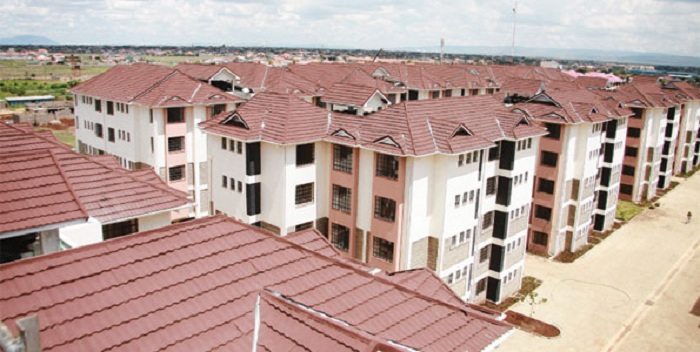Uganda’s partnership with Libya in National Housing and Construction Company is almost coming to a close as the two look to part ways.
The government has started working on plans to fully take over the entire shareholding of National Housing and Construction Company (NHCC) from the Libyan government.
Government believes that with NHCC under their control, the company could have the right investment strategy to put up more housing units and help reduce the national deficit that currently stands at 1.6 million.
Chris Baryomunsi, the state minister for Housing, said the government believes that when it acquires 100 per cent stake in the company, the company will be more effective and help solve the housing challenges the country faces.
“We want to acquire 100 per cent shares of NHCC, and then we will be able to talk to National Social Security Fund (NSSF), Housing Finance bank and the ministry of finance to capitalize the company, which will be put to task to construct cheaper houses for Ugandans,” he said.
Baryomunsi was speaking during the launch of Uganda National Housing Policy in Kam- pala recently. NHCC, a 50-year old company, is co-owned by Libyan Africa Investment Company of the Libyan government, which has a 49 per cent stake worth $21.1 million, according to the Libyan embassy website.
The Uganda government owns the remaining stake. Full ownership of the company could force the company to list some shares on the Uganda Securities Exchange by offloading them to the public.
Government’s plan to take up full ownership of NHCC is an- other indication of how Libya’s investments are slowly fizzling out of the Ugandan economy. Libyan investments in Uganda were heavily impacted after the United States of America and much of Europe slapped sanctions on Libya, and later played a role in the ousting of Muammar Gadaffi, the country’s former leader.
With a number of Libya’s bank accounts frozen, there was little flow of capital into the companies that the Arab nation had a stake in. It is not clear how much money government will pay for the Libyan stake or whether the amount could spark off a boardroom battle.
What is clear, though, is that NHCC needs quick recapitalisation and it is unlikely that the Libyans, who still have the sanctions hovering over them, are willing to put more money into the company.
Baryomunsi said the government will recapitalize the company with Shs 100 billion in the coming financial year.
“There are concerns that most projects, especially in housing where the company has expertise, are done by foreign companies. But when we capitalize NHCC, the company will be able to do all construction projects as well as the roads,” he said.
Parity Twinomujuni, the chief executive officer of NHCC, said the government has confirmed that it will inject the Shs 100bn into the company. He also explained that it will be easier for the company to plan when the funds are available.
Ruhakana Rugunda, the prime minister, said even though NHCC has the full support of the government, the company has failed to solve the housing challenges in the country.
“I feel embarrassed when NHCC is putting up 20 to 30 units of houses. They should be putting up thousands of houses; we expect a lot from you.” He added: “The purpose of this policy will be to increase the production of the housing for all income groups.”
Rugunda said: “We need to in- crease 60,000 units to 200,000 units per annum so as to meet the increasing needs by 2022, and this can be done if we have a company that we wholly control as a government.”
NHCC plans to put up a housing project in Bukerere, where it intends to put up 2,000 to 3,000 housing units with three to four bedrooms each. Also, the company intends to implement a real estate housing project in Luzira, where it will construct 192 flats of four levels with three bed-rooms. NHCC recently launched the Impala Housing Estate in Namungoona, where 133 housing units were put on the market.
Rugunda said there was a need for government to play a more critical role in reducing the housing deficit.
“We have realized that most of the real estate housing and establishment of housing has been left to the private sector. We should start utilizing NSSF money like other countries, like Kenya and Tanzania,” he said.
In countries such as Kenya and Tanzania, their social security funds are at the forefront in providing low-cost housing for low and middle-income earners. Uganda’s NSSF has in the recent past spread more of its investment into the real estate industry. NSSF announced recently that it would avail Shs 40bn to local players in the real estate sector in order to put up more housing units.
NSSF Managing Director Richard Byarugaba said in a press statement that some of the factors contributing to a deficit in affordable housing include lack of affordable finance… He said NSSF will offer the finance needed to reduce the shortage of affordable housing.
Rugunda said the Uganda National Housing Policy will pro- mote urban housing interventions that will encourage urban authorities to provide adequate and affordable housing.
“The overall housing situation in the country is characterized by inadequate housing in terms of quality and quantity both in ur- ban and rural areas with a housing deficit of 1.6 million units, out of which 210,000 units are needed in urban areas,” he said.
Agnes Kalibala, the director of housing in the ministry of Lands, Housing and Urban Development, who is also the chairperson of NHCC, said Uganda has an estimated 900,000 units which are substandard and need replacement or upgrading.
“The new housing policy will lay emphasis on regular repair and maintenance of properties. It will also advocate for regular property inspections by competent authorities from urban and local governments and managers in the real estate,” she said.

